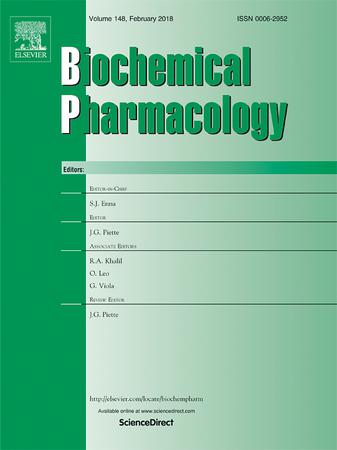靶向PI3K/AKT/mTOR通路治疗乳腺癌的战略进展。
IF 5.3
2区 医学
Q1 PHARMACOLOGY & PHARMACY
引用次数: 0
摘要
乳腺癌(BC)是一种影响全球数百万妇女的复杂疾病。这种疾病的影响越来越大,需要先进的治疗策略来改善患者的预后。PI3K/AKT/mTOR通路是乳腺癌治疗的重点,因为它在肿瘤生长、存活和抗药性等重要过程中发挥着重要作用。靶向这一通路可带来更好的治疗方案和疗效。本综述探讨了PI3K/AKT/mTOR通路如何在BC中失调,重点关注导致其恶化的基因变化,如PIK3CA突变和PTEN缺失。目前的治疗方案包括使用针对 PI3K、AKT 和 mTOR 的抑制剂,联合疗法有望克服耐药性并提高疗效。展望未来,下一代抑制剂和以生物标志物分析为指导的个性化治疗方案可能会为患者提供更准确、更有效的选择。将这些通路抑制剂与免疫疗法相结合,为增强抗肿瘤反应和提高生存率提供了一个令人兴奋的机会。本综述全面总结了目前在靶向治疗 BC 中 PI3K/AKT/mTOR 通路方面取得的进展。它强调了旨在提高患者预后和生活质量的未来研究方向和治疗策略。本文章由计算机程序翻译,如有差异,请以英文原文为准。

Strategic advancements in targeting the PI3K/AKT/mTOR pathway for Breast cancer therapy
Breast cancer (BC) is a complex disease that affects millions of women worldwide. Its growing impact calls for advanced treatment strategies to improve patient outcomes. The PI3K/AKT/mTOR pathway is a key focus in BC therapy because it plays a major role in important processes like tumor growth, survival, and resistance to treatment. Targeting this pathway could lead to better treatment options and outcomes. The present review explores how the PI3K/AKT/mTOR pathway becomes dysregulated in BC, focusing on the genetic changes like PIK3CA mutations and PTEN loss that leads to its aggravation. Current treatment options include the use of inhibitors targeting PI3K, AKT, and mTOR with combination therapies showing promise in overcoming drug resistance and improving effectiveness. Looking ahead, next-generation inhibitors and personalized treatment plans guided by biomarker analysis may provide more accurate and effective options for patients. Integrating these pathway inhibitors with immunotherapy offers an exciting opportunity to boost anti-tumor responses and improve survival rates. This review offers a comprehensive summary of the current progress in targeting the PI3K/AKT/mTOR pathway in BC. It highlights future research directions and therapeutic strategies aimed at enhancing patient outcomes and quality of life.
求助全文
通过发布文献求助,成功后即可免费获取论文全文。
去求助
来源期刊

Biochemical pharmacology
医学-药学
CiteScore
10.30
自引率
1.70%
发文量
420
审稿时长
17 days
期刊介绍:
Biochemical Pharmacology publishes original research findings, Commentaries and review articles related to the elucidation of cellular and tissue function(s) at the biochemical and molecular levels, the modification of cellular phenotype(s) by genetic, transcriptional/translational or drug/compound-induced modifications, as well as the pharmacodynamics and pharmacokinetics of xenobiotics and drugs, the latter including both small molecules and biologics.
The journal''s target audience includes scientists engaged in the identification and study of the mechanisms of action of xenobiotics, biologics and drugs and in the drug discovery and development process.
All areas of cellular biology and cellular, tissue/organ and whole animal pharmacology fall within the scope of the journal. Drug classes covered include anti-infectives, anti-inflammatory agents, chemotherapeutics, cardiovascular, endocrinological, immunological, metabolic, neurological and psychiatric drugs, as well as research on drug metabolism and kinetics. While medicinal chemistry is a topic of complimentary interest, manuscripts in this area must contain sufficient biological data to characterize pharmacologically the compounds reported. Submissions describing work focused predominately on chemical synthesis and molecular modeling will not be considered for review.
While particular emphasis is placed on reporting the results of molecular and biochemical studies, research involving the use of tissue and animal models of human pathophysiology and toxicology is of interest to the extent that it helps define drug mechanisms of action, safety and efficacy.
 求助内容:
求助内容: 应助结果提醒方式:
应助结果提醒方式:


